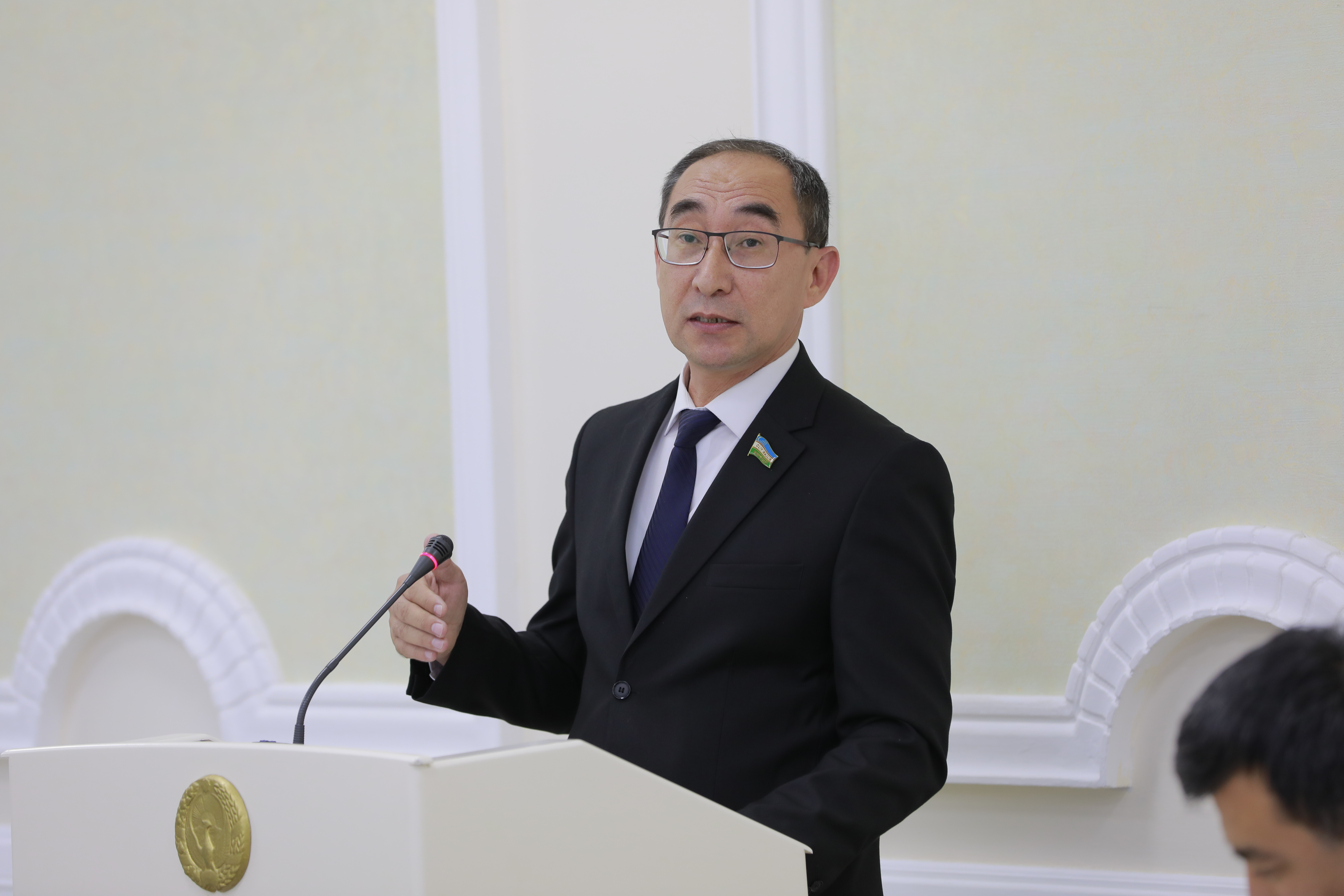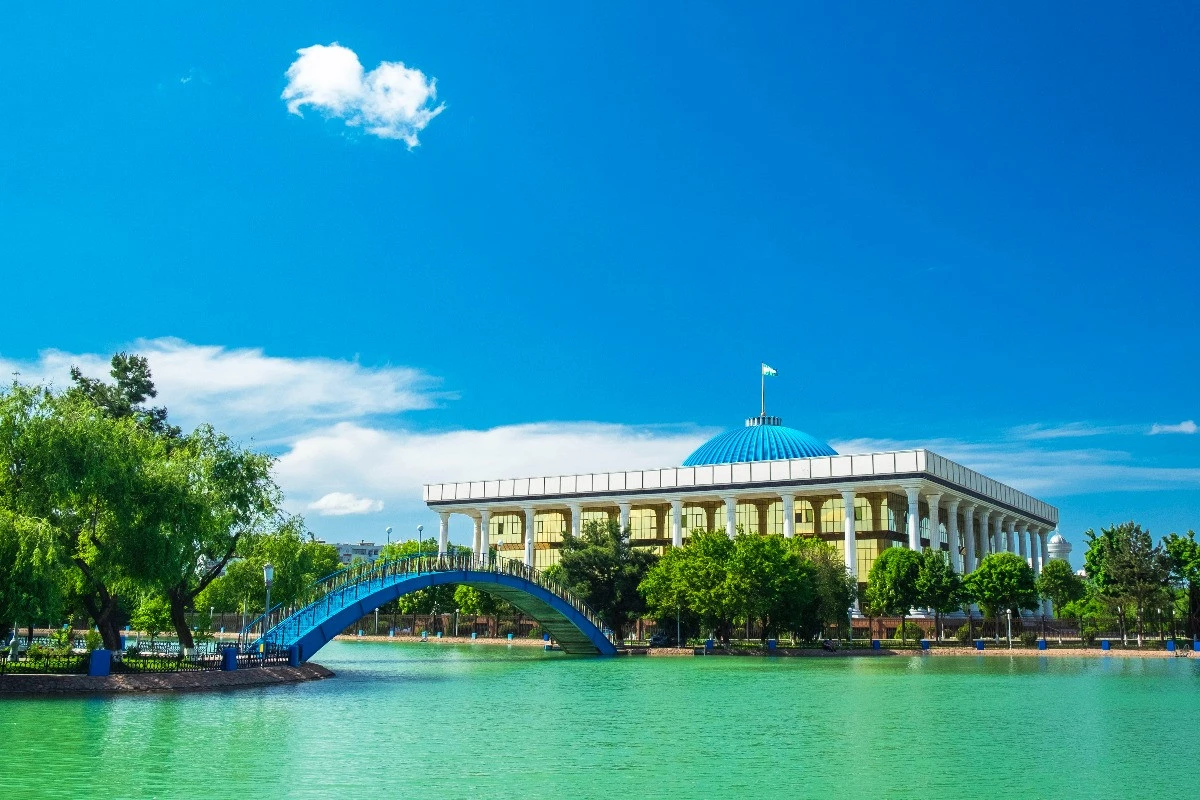Parliament is distinct from other branches of power by a unique trait, which characterizes it as the only collegial body representing the interests of all social groups and segments of the population (through representatives of the people); delivering conditions for the implementation of ideas popular in the country (through political parties); shaping the legal framework of the life of the nation (through the legislative function of the body); providing adequate mechanisms for checking and overseeing the executive power (through the oversight function of parliament).
If the reforms in Uzbekistan aimed at developing parliamentarianism, which has had a key role to play in the transformation of public administration, can be divided into stages, one can conditionally consider the first phase lasting from 1991 to 2004 that included the establishment, development and creation of legal frameworks for a unicameral parliament. The second period (2005-2016) saw the formation of a bicameral legislature and the introduction of democratic principles into public administration. The third stage, starting in 2016, provides for the execution of objectives to enhance democratic reforms and bolster the role of parliament and political parties in the modernization of the country, as well as the implementation of public control mechanisms.
The first phase of reforms (1991–2004) sought to:
- shape a public administration system;
- deliver foundations of national statehood built on the separation of powers;
- create a legal framework for reforms in state-building and public administration;
- establish a democratic electoral system;
- arrange a multi-party system;
- provide for the basis of a democratic electoral system.
Prior to the adoption of the Constitution, laws were developed to shape the foundation for transformation in Uzbekistan’s legal system. The 12th the Supreme Council passed 182 laws, 4 codes and 509 resolutions. The national independence of Uzbekistan also received a legal basis in the form of a Constitution and laws defining the powers of the legislative, executive and judicial branches.
In particular, laws on public associations in the Republic of Uzbekistan, on elections to the Oliy Majlis (Supreme Assembly, the current national parliament) of the Republic of Uzbekistan, on elections of people’s deputies to regional, district and city Kengashes (Councils), on guarantees of citizens’ franchise, on citizens’ appeals, on the Oliy Majlis, on the status of deputies in the Republic of Uzbekistan served as the legal source for the enactment of tasks identified at the first stage of the initial period of reforms (1991-1995).
The Constitution of the independent country (December 8, 1992) established legitimate democratic principles of development of the state and society and applied the norms of the principle of separation of powers (Article 11).
The Basic Law notes that the Oliy Majlis of the Republic of Uzbekistan is the highest state representative body exercising legislative power, and its powers are clearly defined.
Parliamentary oversight is the activity of an independent and legitimate systemic representative body, that is, chambers, committees and commissions of parliament, the executive power of its members, of other government bodies and economic management bodies to ensure compliance with the rights and freedoms of citizens as well as the new edition of the Constitution, monitor the implementation of adopted laws.
Parliamentary oversight is carried out by hearing reports on the execution of the State Budget and information on current issues, by parliamentary discussions, parliamentary requests, etc.
The essence and significance of the control function of the Oliy Majlis of the Republic of Uzbekistan is enshrined in Article 78 of the Constitution of 1992. The constitutional basis of parliamentary control powers is the approval of the State Budget, oversight of its execution, hearing from appointed and elected officials, as well as the right to send requests to executive authorities and their officials.
The powers of the Oliy Majlis to approve decrees of the President of the Republic of Uzbekistan, endorse appointments or elections, as well as appointments on issues provided for by the Constitution can also be considered as a form of parliamentary oversight.
The control powers of the Oliy Majlis are enshrined in the laws on the Oliy Majlis of the Republic of Uzbekistan, on the status of deputies in the Republic of Uzbekistan, and the regulations on committees and commissions of the Oliy Majlis. The procedure for conducting oversight by the parliament, as well as by committees and commissions, is regulated by the regulations of the Oliy Majlis.
The institution of the Oliy Majlis Commissioner for Human Rights has been introduced, itself an important element of parliamentary oversight. We know that the Ombudsman, relying on a representative body, exercises control over executive authorities whose officials, through their actions or inactions, violate the rights and legitimate interests of citizens. According to the Law “On the Commissioner of the Oliy Majlis for Human Rights (Ombudsman)”, adopted on 27 April 1997, the activities of the Commissioner, based on the institution’s legal status, cover important areas of public relations relating to the state and citizens, society and the individual.
The Ombudsman exercises parliamentary control in the field of human rights over compliance with the implementation of legislative acts by state bodies, self-government bodies of citizens, enterprises, institutions, organizations, public associations, and officials.
The second stage covers the years 2005-2016, when a bicameral parliament came into being in the country and democratic principles were consistently introduced into public administration. In 2005, the Oliy Majlis was formed on the basis of a bicameral system. The purpose of establishing a professional parliament sought to:
first, deliver a system of checks and balances essential for the legislature to effectively exercise its powers and take reasoned and comprehensive decisions;
second, improve the quality of parliament’s work in legislative activities, provided that the Legislative Chamber (the lower house) carries out its activities as a professional, constantly operating body;
third, strike a balance between national and local interests, taking into account the fact that the Senate (upper house of the parliament) mainly consists of regional representatives of local Kengashes, and also performs representative functions;
fourth, enhance the scope of participation of the population in the socio-political life of the country.
A permanent parliament is essential to securing the rule of law. In accordance with the amendments to the Constitution, adopted at a referendum in 2003, the powers of the bicameral parliament to form and control the government were expanded. An important factor in ensuring parliamentary oversight was the enshrinement in the Basic Law of the norm on the responsibility of the Cabinet of Ministers to the Oliy Majlis. The chambers of the Oliy Majlis have joint powers to consider and approve, upon the proposal of the President, the candidacy of the Prime Minister.
Part of the powers of the President, such as the appointment, approval and dismissal of heads of state bodies, the judicial system and special services, diplomatic and other representatives in foreign countries and international organizations, were transferred to the Senate. The exclusive powers of the Senate also include hearing reports from the Prosecutor General, the Chairperson of the State Committee for Nature Protection, the Chairperson of the Central Bank, as well as the adoption of acts of amnesty.
The practice of reviewing the report of the Accounts Chamber has been introduced as an important form of parliamentary control. The fact that the Legislative Chamber of the Oliy Majlis conducts its work on a professional basis has improved the quality of legislative activity. The joint activities of the Legislative Chamber and the Senate made it possible to harmonize national and local interests.
Improving the system for ensuring a balance between the activities of parliament and government bodies has led to the intensification of the political life of society.
The third stage, starting in 2016, provides for the implementation of tasks to deepen democratic reforms and strengthen the role of parliament and political parties in the modernization of the country, and the application of public control mechanisms.
The legal foundations of parliamentary oversight of the Oliy Majlis of the Republic of Uzbekistan are reflected in such legislative acts as laws “On the Legislative Chamber of the Oliy Majlis of the Republic of Uzbekistan”, “On the Senate of the Oliy Majlis of the Republic of Uzbekistan”, “On the Regulations of the Legislative Chamber of the Oliy Majlis of the Republic of Uzbekistan”, “On the Regulations of the Senate Oliy Majlis of the Republic of Uzbekistan”, “On the Status of Deputy of the Legislative Chamber and Member of the Senate of the Oliy Majlis of the Republic of Uzbekistan”, “On Parliamentary Oversight”, among others.
Adopted in 2016, the Law “On Parliamentary Oversight” regulates relations in the sphere of organization and implementation of parliamentary control; it clearly defines the subjects, objects and forms of parliamentary oversight.
According to Article 4 of this Law, the activities of government bodies and their officials in the implementation of the Constitution and laws of the Republic of Uzbekistan, resolutions of the chambers of the Oliy Majlis of the Republic of Uzbekistan and their bodies, state programs, as well as in the implementation of the tasks and functions assigned to them can be objects of parliamentary oversight.
Forms of parliamentary control include consideration of the report of the Cabinet of Ministers on the progress of the implementation of the state program for the corresponding year, arising from the Address of the President of the Republic of Uzbekistan to the people and the Oliy Majlis of the Republic of Uzbekistan, the annual National Report on Combating Corruption in the Republic of Uzbekistan of the Anti-Corruption Agency of the Republic of Uzbekistan and the practice of conducting parliamentary investigation.
Based on the Strategy of the New Uzbekistan, the key direction for improving the country’s public administration is to increase the government’s accountability to parliament, expand the powers of the legislative body based on the principles of separation and mutual checks, and boost its role in the political life of the country. A procedure has been established for the approval by the Legislative Chamber and approval by the President, upon the recommendation of the Prime Minister, of candidates for deputy Prime Ministers, ministers and chairpersons of state committees.
A procedure has also been introduced for submitting to deputies the short- and medium-term action programs for the development of a sphere by a candidate to membership of the Government.
In the Legislative Chamber of the Oliy Majlis of the Republic of Uzbekistan, Government Hour is held on persistent basis to hear reports from government officials.
In order to study the real situation on the ground and take the necessary measures to address existing problems, as well as consider appeals, the practice of monthly visits of members of parliament to constituencies has been introduced.
Another noteworthy fact is the consolidation of parliamentary control over the activities of local executive bodies, the creation of a permanent secretariat of local Kengashes of people’s deputies. Candidates for the positions of heads of regional, district and town government bodies are approved by corresponding Kengashes of people’s deputies.
Systemic changes in the legislative power in Uzbekistan were carried out during every phase of the enduring reforms, taking into account real historical conditions with the corresponding level of development of the political system and its principal elements. Each stage of reforms has shown that a balanced system of state apparatus is being created in Uzbekistan, designed to augment the efficiency of democratic institutions and ensure the formation of advanced civil society. In turn, democratic changes in the country and the role of parliament in reforming all spheres of public life have enhanced the possibilities for the effective implementation of its function of oversight.

